1 Jun 2016 | Campaigns, Campaigns -- Featured, mobile, Press Releases, What A Liberty!
 “What a Liberty!, based on passionate young voices, giving us the tools and freedom to express who we are and what we believe in. Sparking conversation. We’re here to influence the future. We’re here to promote a new charter. We are Magna Carta 2.0.”
“What a Liberty!, based on passionate young voices, giving us the tools and freedom to express who we are and what we believe in. Sparking conversation. We’re here to influence the future. We’re here to promote a new charter. We are Magna Carta 2.0.”
Brought together from all walks of life by What a Liberty!, and supported by a £36,200 grant from the Heritage Lottery Fund, the project is led by Index on Censorship with support from Bishopsgate Institute and C1 Media. Together, 18 young people explored and debated the concepts included in the original document before moving to create their Great Charter.
“What I’ve learned from being on the Magna Carta 2.0 is that everyone has a say. If a group of teenagers can come together and create this incredible project and speak their voices and make a change, then anyone can make a change,” Charlotte Gray, a What a Liberty! participant, said.
Magna Carta 2.0 aims to spark discussion, provoke change and encourage young people to make sure their voice is heard. The teens focused on the need for justice, education and environmental consciousness:
- Equal opportunities should be available for all, regardless of race, gender and class, in both the workplace and the educational system.
- Gender neutrality should be seen as equally important to gender equality.
- Freedom of speech shall be protected all around the world as one of the most valuable rights that people have.
- There shall be freedom for all to explore and express their sexuality and identity.
- Political education should be taught to all young people in secondary school in order to tackle disengagement and lack of political awareness.
- Educational opportunity should not be limited to a few – everyone must have an equal chance to succeed.
- Corporations must take more responsibility over their C02 emissions and pollution levels, and will convert to the use of green power with zero emissions targets in the near future.
“Magna Carta 2.0 is the culmination of a process during which What a Liberty! facilitators worked with the young people to research the foundations of the UK’s human rights by giving them access to Magna Carta in Lincoln and an amazing archive of material at the Bishopsgate Institute. They also met with experts from a variety of fields before deciding for themselves what the group wanted to include. On a personal level, I was consistently impressed by the diligence and ambition the young people applied to this project,” Helen Galliano, What a Liberty! project producer, said.
The What a Liberty! group has set out to inspire other young people to engage with politics and human rights by adding their voice to the Magna Carta 2.0. They’ve launched a self-managed website and social media presence (Twitter, Facebook, YouTube, Instagram) to spread the word and spark discussions about human rights in the 21st century. The site includes a Magna Carta 2.0 film, scripted and filmed by the young people collectively and features a spoken word poem that outlines the issues they feel passionate about, written by former Tottenham young poet laureate Janache John-Baptiste, a What a Liberty! participant.
On Wednesday 6 July the What a Liberty! team will hold a Magna Carta 2.0 kick off event hosted by the Collection Museum in Lincoln, a short walk from the original Magna Carta. The day will include a programme of workshops for local young people, a presentation, Q&A session, key-note speech and graduation ceremony for the group as they launch into the next phase of the project. The Lincoln launch will be an opportunity for the group to present their work in a professional environment, within a rich historical context.
To find out more about attending the event, please contact Helen Galliano on [email protected].
About Heritage Lottery Fund
Thanks to National Lottery players, we invest money to help people across the UK explore, enjoy and protect the heritage they care about – from the archaeology under our feet to the historic parks and buildings we love, from precious memories and collections to rare wildlife. www.hlf.org.uk @heritagelottery
About Index on Censorship
Index on Censorship is an international organisation that defends people’s freedom to express themselves without fear of harm or persecution. The inspiration of poet Stephen Spender, Index was founded in 1972 to publish the untold stories of dissidents behind the Iron Curtain. Today, we fight for free speech around the world, challenging censorship whenever and wherever it occurs. indexoncensorship.org @IndexCensorship
For further information, please contact
Index on Censorship: Helen Galliano, Project Producer, 02079637296 or [email protected]
Heritage Lottery Fund: Felix Gott, Communications Manager, 02075916138 or [email protected]
31 May 2016 | About Index, Campaigns, Campaigns -- Featured, European Union, Statements
Index on Censorship condemned the agreement between the European Commission and tech firms Facebook, YouTube, Twitter and Microsoft to tackle hate speech online.
“Hate speech laws are already too broad and ambiguous in much of Europe,” said Index on Censorship chief executive Jodie Ginsberg. “This agreement fails to properly define what ‘illegal hate speech’ is and does not provide sufficient safeguards for freedom of expression.
“The agreement once again devolves power to unelected corporations to determine what amounts to hate speech and police it – a move that is guaranteed to stifle free speech in the mistaken belief this will make us all safer. It won’t. It will simply drive unpalatable ideas and opinions underground where they are harder to police – or to challenge.
“There have been precedents of content removal for unpopular or offensive viewpoints and this agreement risks amplifying the phenomenon of deleting controversial – yet legal – content via misuse or abuse of the notification processes.”
31 May 2016 | Events, Middle East and North Africa
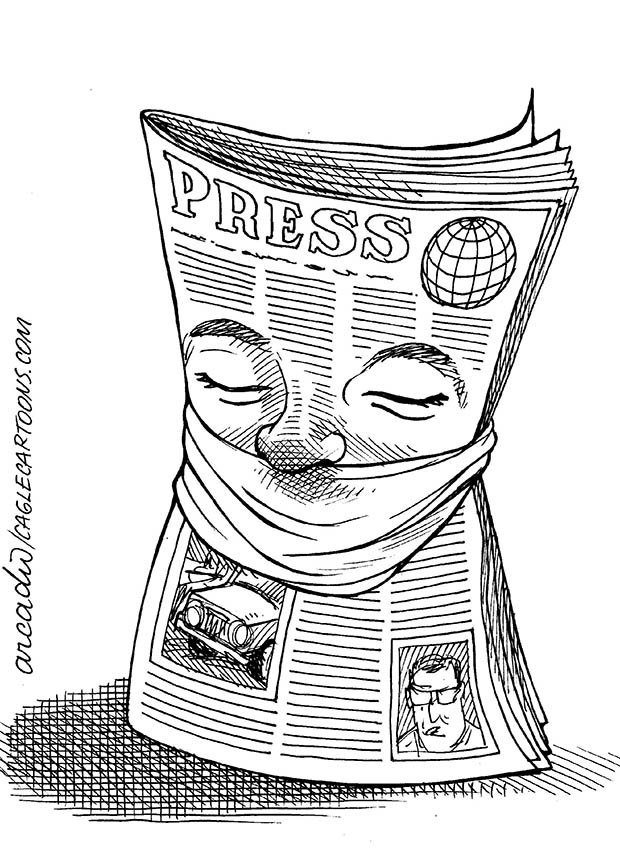
The New Arab news network invites you to a panel discussion to discuss the challenges faced by the media and journalists in the post-Arab Spring era. The Arab Spring of 2011 presented hope for a region free from dictatorial rule and media constraints, but since the people’s uprising, much the opposite has happened. The Arab world is still plagued by media censorship, and independent journalism and objective coverage can be a life-threatening exercise.
The Arab Spring of 2011 presented hope for a region free from dictatorial rule and media constraints, but since the people’s uprising, much the opposite has happened. The Arab world is still plagued by media censorship, and independent journalism and objective coverage can be a life-threatening exercise.This discussion will explore the current state of the media in the region and the future of press freedom in the wider Arab world.
This discussion will explore the current state of the media in the region and the future of press freedom in the wider Arab world.
Hosted and Chaired by SNP MP Tommy Sheppard.
Speakers Include:
– Faitma El-Issawi, research fellow, LSE Middle East Centre
– Melody Patry, advocacy officer at Index on Censorship
– Abdu Elshayyal, CEO of The New Arab
When: Wednesday, 15 June 2016 from 5.30-7pm
Where: Conference Room 15, House of Commons, London, SW1A 0AA (view map)
Tickets: Free, but registration is required.
27 May 2016 | About Index, Azerbaijan, Europe and Central Asia, mobile, News and features
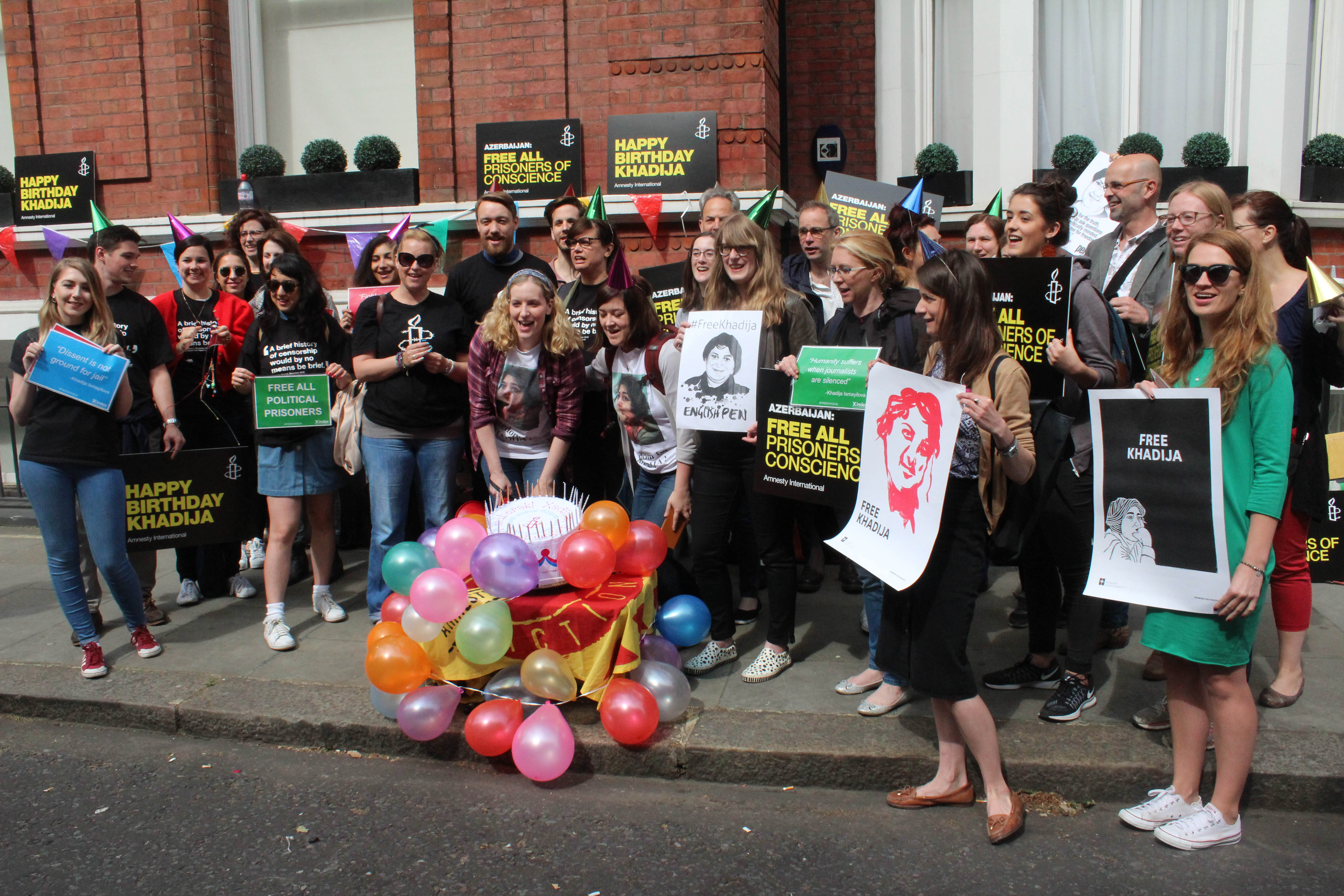
Protest for Khadija Ismayilova, Azerbaijan embassy, London. Credit: Cat Lucas, English Pen
Azerbaijani investigative journalist Khadija Ismayilova may have been released from prison on Wednesday, but two trumped-up charges against her — illegal entrepreneurship and tax evasion –remain. Her seven-and-a-half-year jail sentence has only been reduced to a three-and-a-half-year suspended term and she isn’t free to leave the country.
Today is Ismayilova’s 40th birthday and to mark the occasion, protesters gathered at 40 different demonstrations from around the world, not just to celebrate, but to call for all charges against her to be quashed. Index joined other members of the Sports for Rights coalition at the Azerbaijani embassy in London (see above).
“Let’s take a moment to celebrate the work that’s been done by this remarkable woman,” Rebecca Vincent, the co-ordinator of the Sport for Rights campaign, told demonstrators.
Currently, around 70 political prisoners — including journalists, bloggers, activists and religious followers — sit in Azerbaijani jails, and Vincent called on protesters to sustain their focus on all of them. “That’s what Khadija has asked for for her birthday,” she said.
Seymur Hezi is an Azerbaijani journalist serving a five-year prison sentence on charges of “aggravated hooliganism”. Hezi, who contributed to the Index on Censorship Freedom of Expression Award-winning newspaper Azadliq, was sentenced on 29 January 2015. He was arrested on 29 August 2014 following an altercation in which the journalist was defending himself from a physical assault and harassment, according to his lawyers. “His case doesn’t get enough international attention, possibly because he is not an English speaker and not well networked,” Vincent said.
Other political prisoners include Ilgar Mammadov, the opposition politician who leads Azerbaijan Republican Alternative Movement, who has been in jail for over three years, and Ilkin Rustemzade, the activistt originally jailed following his Harlem Shake video filmed in Baku.
On the same day Ismayilova was released, two more political prisoners, a youth activist and a journalist, were arrested.
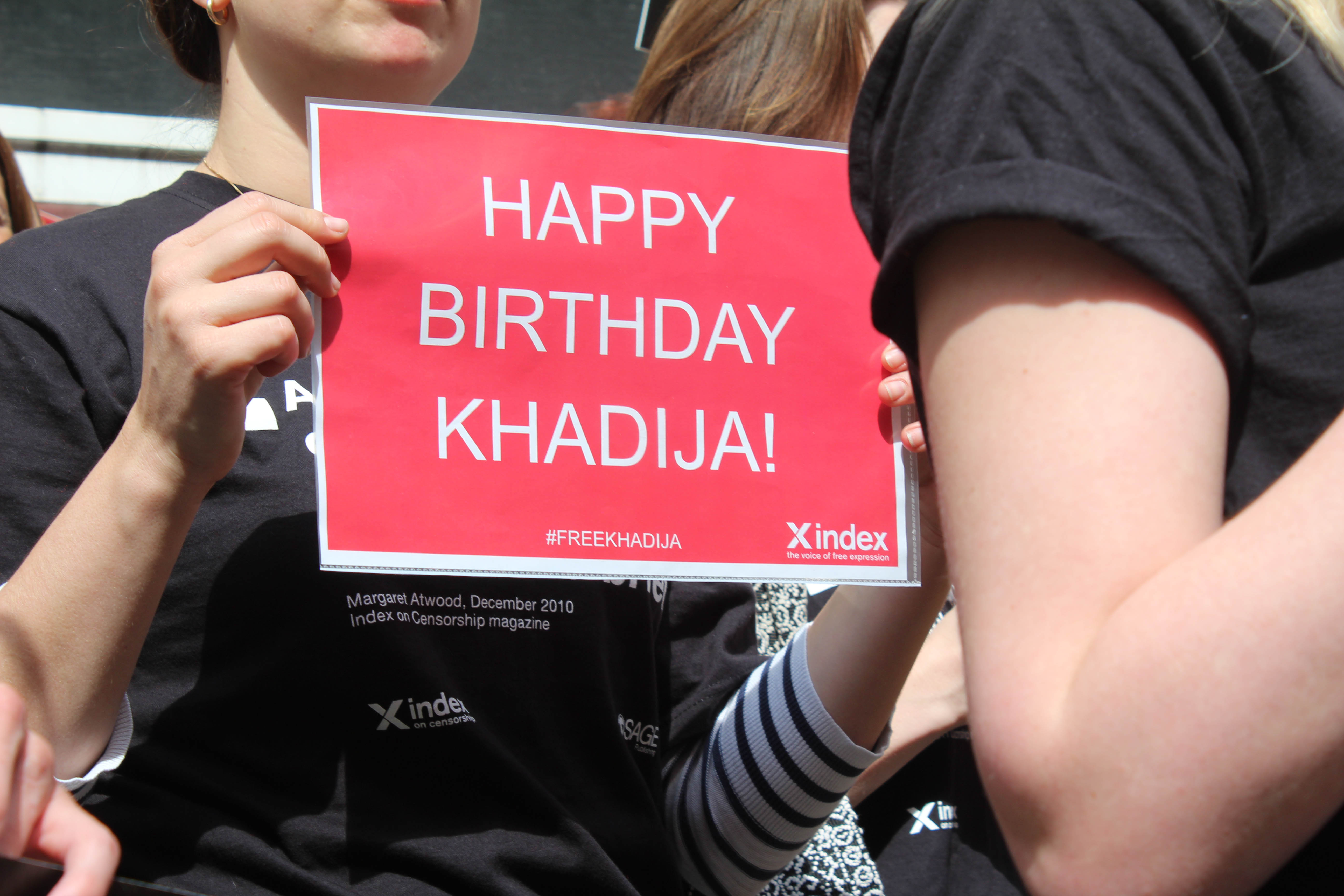
Protest for Khadija Ismayilova, Azerbaijan embassy, London. Credit: Cat Lucas, English Pen
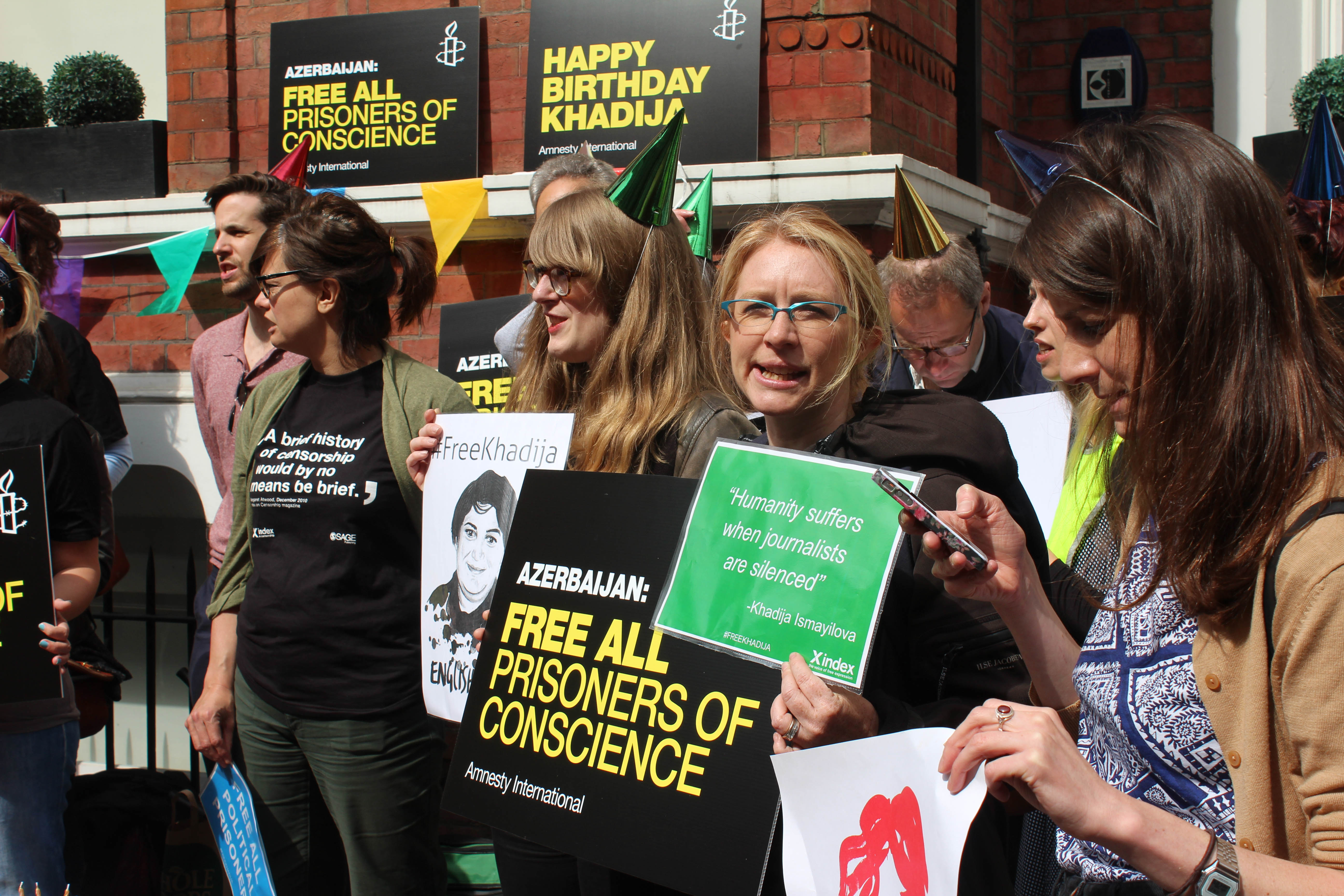
Protest for Khadija Ismayilova, Azerbaijan embassy, London. Credit: Cat Lucas, English Pen
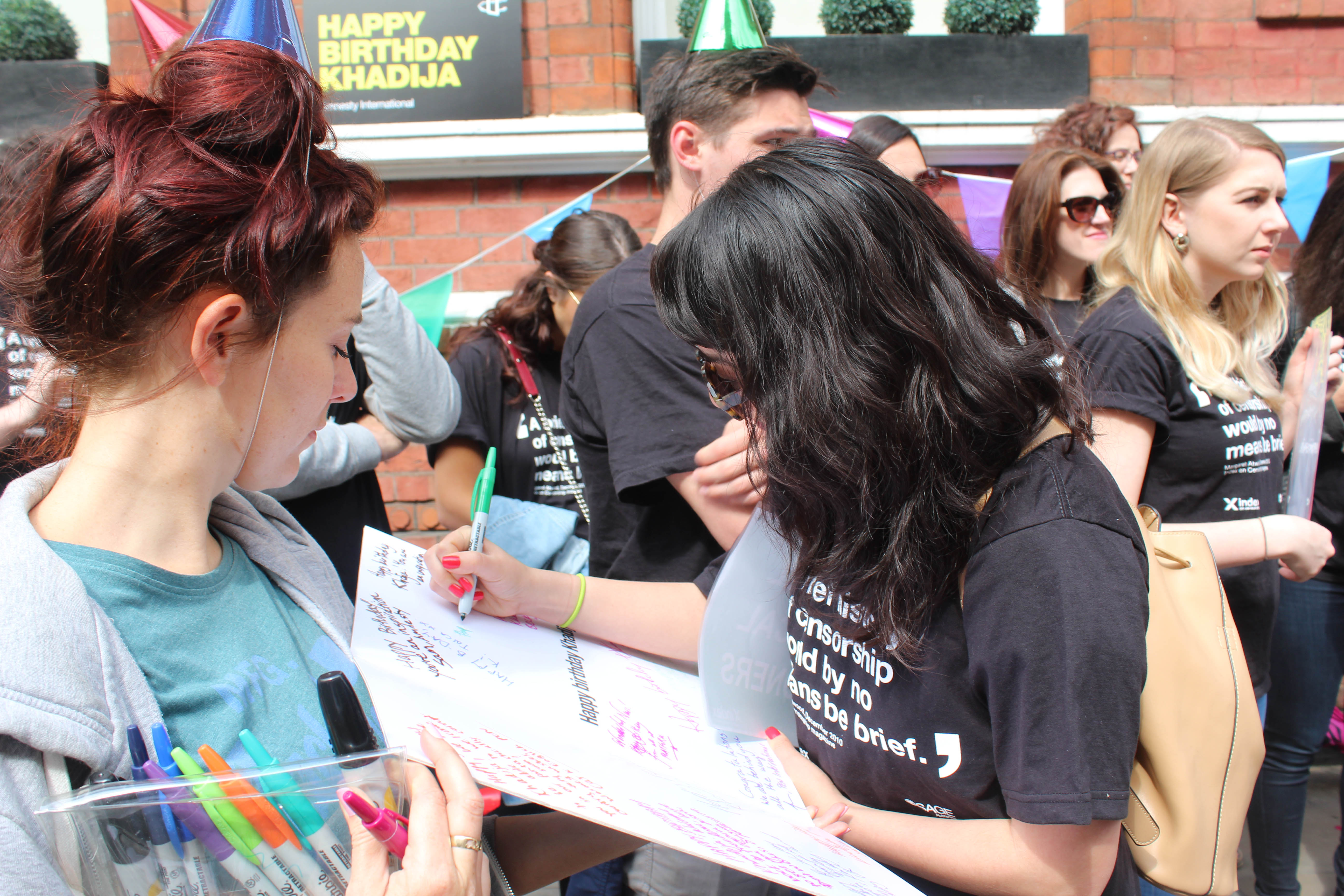
Protest for Khadija Ismayilova, Azerbaijan embassy, London. Credit: Cat Lucas, English Pen
Many more protests took place today. Here are some of them:
Paris, France
Washington DC, USA
Brussels, Belgium
Oslo, Norway
 “What a Liberty!, based on passionate young voices, giving us the tools and freedom to express who we are and what we believe in. Sparking conversation. We’re here to influence the future. We’re here to promote a new charter. We are Magna Carta 2.0.”
“What a Liberty!, based on passionate young voices, giving us the tools and freedom to express who we are and what we believe in. Sparking conversation. We’re here to influence the future. We’re here to promote a new charter. We are Magna Carta 2.0.”




